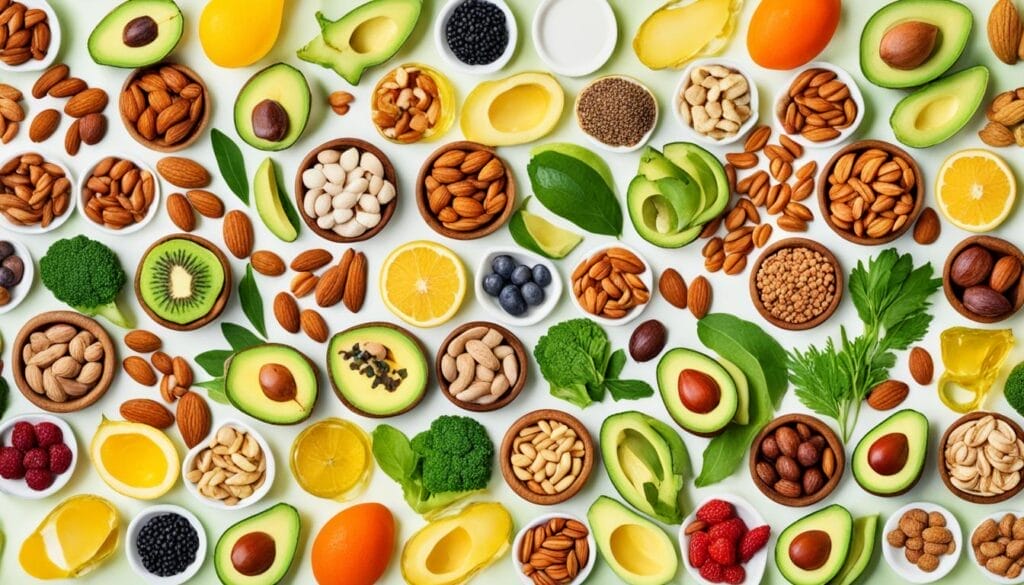Hi there! I’m excited to share with you my guide for balanced eating, focusing on the importance of healthy fats. Now, let me start by telling you a little story…
Once upon a time, in a land not so far away, there lived a young woman named Emma. Emma was passionate about living a healthy lifestyle. She exercised regularly, ate a variety of fruits and vegetables, and always made sure to choose nutrient-rich foods for her meals.
However, Emma had always been a bit confused about fats. She had heard conflicting information about whether fats were good or bad for her health. So, she decided to do some research to clear up her confusion.
Emma discovered that not all fats are created equal, and there are indeed healthy fats that are essential for our bodies. These healthy fats, known as monounsaturated fats and polyunsaturated fats, play a crucial role in maintaining a balanced diet and promoting overall well-being.
Emma was fascinated to learn that healthy fats provide us with essential fatty acids, such as omega-3 and omega-6, which our bodies cannot produce on their own. These essential fatty acids have numerous health benefits, including reducing the risk of heart disease and stroke, supporting brain health, and even aiding in a healthy pregnancy.
Incorporating healthy fats into her meals also helped Emma feel more satisfied after eating, reducing hunger and aiding in weight management. She realised that by including foods rich in healthy fats, like avocados, nuts, and fatty fish, she could achieve a well-rounded and nutritious diet.
Armed with this newfound knowledge, Emma embraced a diet that included a good balance of healthy fats, proteins, carbohydrates, fruits, and vegetables. She felt more energized, her skin started to glow, and she even noticed an improvement in her mood.
Emma’s story is a testament to the power of healthy fats in our diet. By understanding the benefits of good fats and incorporating them into our meals, we can nourish our bodies, support our overall well-being, and live a healthier, happier life.
Now, let’s move on to the key takeaways from this section:
Key Takeaways:
- Healthy fats, such as monounsaturated fats and polyunsaturated fats, are essential for a balanced diet.
- These fats provide us with essential fatty acids, which have numerous health benefits.
- Incorporating healthy fats into meals can help reduce the risk of heart disease, promote brain health, and aid in weight management.
- Food sources rich in healthy fats include avocados, nuts, seeds, and fatty fish.
- By embracing a diet that includes a good balance of healthy fats, proteins, carbohydrates, fruits, and vegetables, we can support our overall well-being.
The Role of Healthy Fats in a Balanced Diet
Healthy fats, such as monounsaturated fats and polyunsaturated fats, are essential for maintaining a well-balanced diet. These fats provide our bodies with essential fatty acids, such as omega-3 and omega-6, which have numerous health benefits. By incorporating healthy fats into our meals, we can reduce the risk of heart disease and stroke, promote brain health, and support a healthy pregnancy.
The inclusion of healthy fats in our diet also helps us feel more satisfied after eating. When consumed in moderation, they can effectively reduce hunger and aid in weight management. It’s important to note that our bodies cannot produce these essential fatty acids on their own, so it’s crucial to obtain them through our diet.
To highlight the important role of healthy fats, let’s take a closer look at their impact on our well-being:
- Heart Health: Healthy fats, particularly omega-3 fatty acids, have been shown to reduce the risk of heart disease and stroke. They help lower triglyceride levels, regulate blood pressure, and improve overall cardiovascular health.
- Brain Health: Essential fatty acids are vital for brain function and development. They support cognitive function, improve memory, and enhance overall brain health, reducing the risk of age-related cognitive decline.
- Pregnancy: During pregnancy, the intake of healthy fats is crucial for the development of the baby’s brain and eyes. These fats provide essential nutrients for fetal growth and contribute to a healthy pregnancy.
Incorporating healthy fats into our diet can be as simple as adding avocado slices to salads, using olive oil for cooking, or enjoying a handful of nuts and seeds as a snack. By making these small changes, we can ensure that we are reaping the benefits of healthy fats and maintaining a balanced and nutritious eating plan.
Remember, when it comes to fats, quality matters. Opt for foods that are rich in healthy fats to support overall well-being and enjoy the many benefits they provide.
Sources of Healthy Fats
When it comes to incorporating healthy fats into our diet, there is a wide range of options to choose from. Including these foods in our meals not only adds delicious flavour but also provides essential nutrients that support our overall health. Some examples of monounsaturated fats include:
- Olive oil
- Canola oil
- Avocados
- Nuts like almonds and peanuts
Polyunsaturated fats are another important component of a balanced diet. They can be found in various sources, such as:
- Sunflower oil
- Sesame oil
- Flaxseeds
- Fatty fish like salmon and mackerel
These foods are rich in omega-3 fatty acids, which are particularly beneficial for heart health. Omega-3 fatty acids have been shown to reduce the risk of heart disease and promote the overall well-being of our cardiovascular system. By incorporating these sources of healthy fats into our meals, we can achieve a well-rounded and nutritious diet.

Comparison of Healthy Fat-rich Foods
| Monounsaturated Fats | Polyunsaturated Fats |
|---|---|
| Olive oil | Sunflower oil |
| Canola oil | Sesame oil |
| Avocados | Flaxseeds |
| Nuts like almonds and peanuts | Fatty fish like salmon and mackerel |
Understanding Different Types of Fat
To make informed food choices, it is important to understand the different types of fats. Monounsaturated fats and polyunsaturated fats are considered healthy fats, as they have positive effects on heart health and overall well-being. On the other hand, saturated fats and trans fats are considered unhealthy fats and should be consumed in moderation.
Saturated fats, found in foods like red meat and full-fat dairy products, can raise cholesterol levels in the blood, increasing the risk of heart disease. Trans fats, often found in processed foods and fried foods, are particularly harmful to heart health and should be avoided as much as possible.
Understanding the different types of fats can help us make smarter choices when it comes to our diet and overall health.
The Role of Different Types of Fat:
To better understand the impact of different types of fat, here’s an overview of their effects on our health:
| Type of Fat | Effects on Health |
|---|---|
| Monounsaturated fats | Lower LDL (bad) cholesterol levels and reduce the risk of heart disease |
| Polyunsaturated fats | Provide essential fatty acids and have anti-inflammatory properties |
| Saturated fats | Can raise LDL (bad) cholesterol levels and increase the risk of heart disease |
| Trans fats | Increase LDL (bad) cholesterol levels and decrease HDL (good) cholesterol levels, leading to an increased risk of heart disease |
By choosing healthier fats and limiting our intake of unhealthy fats, we can support our heart health and overall well-being.
The Health Effects of Good and Bad Fats
Good fats, such as monounsaturated fats and polyunsaturated fats, offer numerous health benefits. They play a vital role in reducing the risk of heart disease and stroke by lowering bad LDL cholesterol levels and increasing good HDL cholesterol levels. These beneficial effects on cholesterol levels promote a healthy heart and overall cardiovascular well-being.
On the other hand, bad fats, such as saturated fats and trans fats, have detrimental effects on heart health. They raise bad LDL cholesterol levels and lower good HDL cholesterol levels, increasing the risk of heart disease. Consuming high amounts of these bad fats can lead to an increased risk of cardiovascular diseases. It is crucial to be mindful of the types and amounts of fats we consume to maintain a healthy heart.
“Choosing and consuming good fats is essential for promoting a healthy heart and overall well-being.”
Incorporating good fats, such as avocados, nuts, and fish rich in omega-3 fatty acids, into our diet can have significant benefits for heart health. These fats not only contribute to better cholesterol profiles but also provide essential nutrients for overall well-being.
By making informed food choices and favoring sources of good fats, we can take proactive steps to protect our heart health, reduce the risk of heart disease, and promote a balanced and healthy lifestyle.

Comparing the Effects of Good and Bad Fats on Cholesterol Levels
| Type of Fat | Effect on LDL Cholesterol | Effect on HDL Cholesterol |
|---|---|---|
| Monounsaturated fats | Decreases | Increases |
| Polyunsaturated fats | Decreases | Increases |
| Saturated fats | Increases | Decreases |
| Trans fats | Increases | Decreases |
Cooking with Healthy Fats
When it comes to cooking, I always prioritize choosing healthy fats for food preparation. It’s crucial to make informed choices that enhance the nutritional value of our meals while maintaining a balanced intake of fat.
Unsaturated oils, such as vegetable oil, rapeseed oil, olive oil, and sunflower oil, are considered healthier options for cooking. These oils are rich in monounsaturated and polyunsaturated fats, which have numerous health benefits. They can help improve heart health, lower bad cholesterol levels, and reduce the risk of heart disease.
However, it’s important to remember that all types of fat are high in calories. So even when using healthier oils, it’s vital to consume them in moderation to limit fat intake overall.
Choosing and using healthy fats in our cooking can have a significant impact on our well-being. By incorporating unsaturated oils into our recipes, we can add a delightful taste to our dishes while promoting a balanced and nutritious diet.
By adopting healthy cooking practices and limiting the consumption of unhealthy fats, we can enjoy delicious meals that are beneficial to our health. Remember, the key is to strike a balance and embrace a mindful approach to cooking with healthy fats.

The Benefits of Cooking with Healthy Fats
Cooking with healthy fats offers numerous advantages:
- Enhances the flavor and richness of dishes
- Helps absorb fat-soluble vitamins
- Improves satiety and helps control hunger
- Supports brain health and cognitive function
- Promotes healthier skin and hair
Embracing the use of unsaturated oils in our cooking not only adds a delightful taste to our meals but also contributes to our overall well-being. So, let’s make the most of these healthy fats while enjoying the art of culinary creation!
The Importance of Limiting Unhealthy Fat Intake
Consuming excessive amounts of unhealthy fats, such as saturated fats and trans fats, can have negative effects on our health. These fats can increase the risk of heart disease, contribute to weight gain, and lead to various health issues.
To protect our heart health and manage our weight, it is important to limit the intake of foods high in saturated and trans fats. This includes processed meats, fried foods, baked goods, and other unhealthy options.
By reducing our consumption of unhealthy fats, we can make healthier choices that support our overall well-being. Opting for healthier alternatives, such as lean meats, fish, avocados, and nuts, can provide essential nutrients while minimising the risks associated with unhealthy fats.
The Risks of Excessive Fat Intake
Excessive fat intake, especially of unhealthy fats, can have detrimental effects on our health. Here are some of the potential risks:
- Increased Risk of Heart Disease: Consuming high amounts of saturated fats and trans fats can raise cholesterol levels in the blood, leading to a higher risk of heart disease.
- Weight Gain: Unhealthy fats are often calorie-dense, which can contribute to weight gain and obesity if consumed in excess.
- Imbalanced Nutrient Intake: Focusing on unhealthy fats can lead to a diet lacking in essential nutrients, potentially impacting overall health and vitality.
It is essential to strike a balance when it comes to fat intake in order to maintain a healthy lifestyle.
Heart Disease and Weight Management
One of the major concerns associated with excessive fat intake is the increased risk of heart disease. Diets high in unhealthy fats can lead to elevated levels of LDL cholesterol, which is known as the “bad” cholesterol that contributes to heart disease.
Also, excess fat intake can also interfere with weight management efforts. While fats are an important part of a balanced diet, consuming too much can lead to weight gain. This is because fats are high in calories, which can contribute to an energy imbalance and hinder weight loss goals.

Risks of Unhealthy Fats
| Health Risks | Effects |
|---|---|
| Increased Risk of Heart Disease | Elevated cholesterol levels, higher risk of heart attacks and strokes |
| Weight Gain and Obesity | Calorie-dense fats contribute to excess calorie intake and weight gain |
| Impaired Nutrient Intake | A diet high in unhealthy fats may lack essential nutrients |
By being mindful of our fat intake and opting for healthier choices, we can take steps towards protecting our heart health, managing our weight, and promoting overall well-being.
Summing Up
Incorporating healthy fats into our diet is essential for maintaining a balanced and nutritious eating plan. Good fats, such as monounsaturated fats and polyunsaturated fats, provide numerous health benefits. They can help reduce the risk of heart disease, support brain health, and aid in weight management.
On the other hand, excessive intake of bad fats, such as saturated fats and trans fats, can have negative effects on our heart health and overall well-being. It is important to make informed food choices by selecting healthy fats and limiting the consumption of unhealthy fats.
By cooking with unsaturated oils and choosing foods rich in healthy fats, we can promote optimal health and well-being. Remember, a balanced diet that incorporates healthy fats is key to nourishing our bodies and supporting overall vitality.
FAQ
What are healthy fats?
Healthy fats, such as monounsaturated fats and polyunsaturated fats, are beneficial for our health and play a crucial role in maintaining a balanced diet. They provide essential fatty acids that our bodies cannot produce on their own and have numerous health benefits.
What are the benefits of good fats?
Good fats, such as monounsaturated fats and polyunsaturated fats, have numerous benefits, including reducing the risk of heart disease and stroke, promoting brain health, supporting a healthy pregnancy, and aiding in weight management. They also help us feel more satisfied after eating, reducing hunger.
What are the sources of healthy fats?
Some examples of sources of healthy fats include olive oil, avocados, nuts (like almonds and peanuts), sunflower oil, sesame oil, flax seeds, and fatty fish (such as salmon and mackerel). These foods are rich in monounsaturated fats and polyunsaturated fats.
What is the difference between different types of fats?
Monounsaturated fats and polyunsaturated fats are considered healthy fats, while saturated fats and trans fats are considered unhealthy fats. Healthy fats have positive effects on heart health, while unhealthy fats can raise cholesterol levels and increase the risk of heart disease.
What are the health effects of good and bad fats?
Good fats, such as monounsaturated fats and polyunsaturated fats, can lower the risk of heart disease and stroke by reducing bad LDL cholesterol levels and increasing good HDL cholesterol levels. Bad fats, such as saturated fats and trans fats, can raise bad LDL cholesterol levels and lower good HDL cholesterol levels, increasing the risk of cardiovascular diseases.
How should I cook with healthy fats?
When cooking, it is recommended to choose healthier options like vegetable oil, rapeseed oil, olive oil, and sunflower oil, which are rich in monounsaturated and polyunsaturated fats. However, it’s important to remember that fats, even healthy ones, are high in calories, so they should be consumed in moderation.
Why is it important to limit unhealthy fat intake?
Consuming excessive amounts of unhealthy fats, such as saturated fats and trans fats, can have negative effects on our health. They can increase the risk of heart disease, contribute to weight gain, and lead to various health issues. It is important to limit the intake of foods high in saturated and trans fats.
Source Links
Share Me:
READY TO UNLEASH
YOUR BEST SELF?
Click “Sign Me Up!” And Start Your Fitness Transformation!





